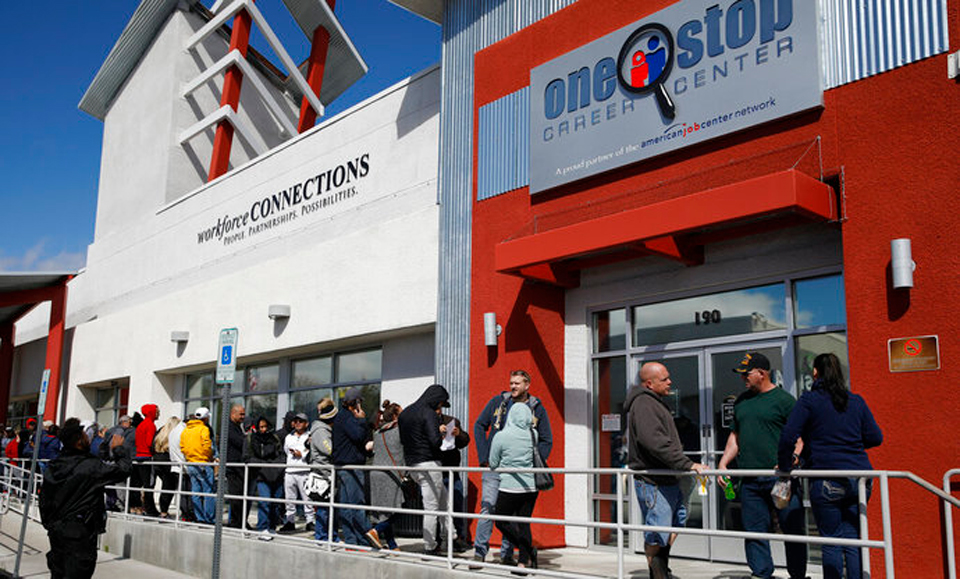
WASHINGTON—Welcome to the rerun of the Great Recession, if not the Great Depression, thanks to the coronavirus pandemic and its spread through the U.S. The lines of jobless people seeking unemployment benefits doubled in the week ending March 28, to 6.6 million, the Labor Department reported on April 2.
Since March began, 10.2 million people have lost their jobs.
That’s because the figures – seasonally adjusted – for the week before rose by 24,000, from the initially reported 3.2 million to 3.3 million, DOL said. That week ended March 14. The surge started the first week of March, when new jobless insurance claims rose by one-third, from 211,000 to 281,000.
Unemployment rolls have swelled since states and cities, following public health advice, ordered the shutdown of non-essential businesses and services to help prevent “community spread” of the coronavirus pandemic.
The comparison with the 2008-10 crash is apt: Bureau of Labor Statistics historical data show the average number of jobless each month of 2010, the crash’s depth, was 14.8 million and the average jobless rate that year hit 9.6%.
“The COVID-19 virus continues to impact the number of initial claims,” DOL said. “Nearly every state providing comments cited the COVID-19 virus.”
“States continued to identify increases related to the services industries broadly, again led by accommodation and food services. However, state comments indicated a wider impact across industries. Many states continued to cite the health care and social assistance, and manufacturing industries, while an increasing number of states identified the retail and wholesale trade and construction industries.”
And it’s only going to get worse, senior analysts Heidi Shierholz and Elise Gould of the Economic Policy Institute warned.
“It’s not often you’ll hear us telling you not to pay attention to the Bureau of Labor Statistics’s monthly employment situation report,” to be released on April 3, they wrote.
“We usually elevate these “jobs day” numbers because they are the timeliest data on payroll employment, the unemployment rate, the share of the population with a job, and wage growth. But this week, the numbers coming out on Friday will be genuinely outdated, if we want a true look at how the coronavirus has affected the economy.”
The 6.6 million jobless insurance claims last week is not data that is almost a month old, they said, but “key information about layoffs in almost real time.” But the regular jobs report numbers come from two surveys which ended March 12.
“Things deteriorated so fast in the last half of March that a mid-month measure will not come close to capturing the current state of the labor market…In the coming weeks, we expect millions more job losses as the economy continues to contract. Based on estimates from Goldman Sachs, we expect 19.8 million to be laid off or furloughed by summer, even accounting for the effect” of the $2.2 trillion stimulus law Congress enacted.
And even the 10 million figure may be low, Gould, in a separate interview, told Business Insider. That’s because it doesn’t count people who don’t apply for jobless benefits because they don’t know about them or because they’re – like the undocumented – ineligible for them. The $2.2 trillion economic rescue law Congress passed does virtually nothing for undocumented workers.
The unadjusted jobless claims numbers for last week showed 2.9 million people showing up or calling – and in many cases, swamping – state jobless benefits offices in the week ending March 28. The eye-popping number was in California, where 692,394 new people filed jobless claims, bringing the statewide total to 878,727.
Other large statewide increases were in New York (+286,404, to 366,403), Michigan (+183,080, to 311,086) and Florida (+152,687 to 227,000).












Comments